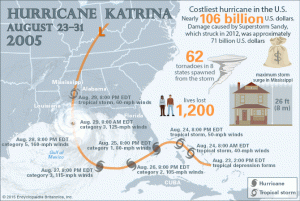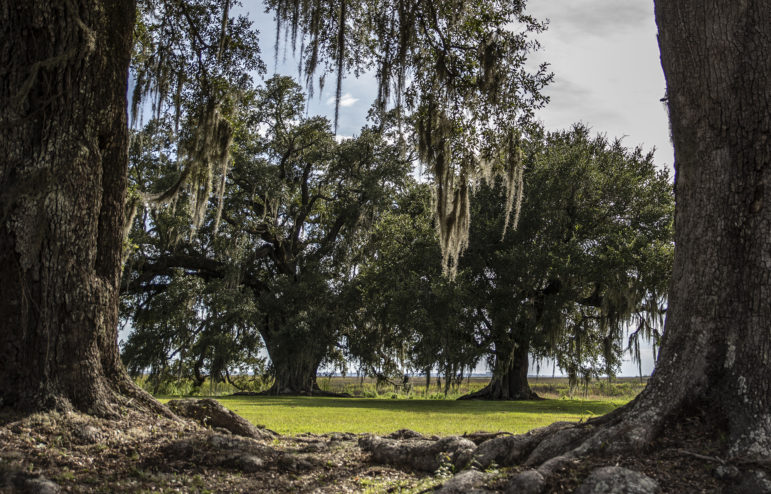…Well, the first thing I can say relates to the coincidental reading of Salvage the Bones not long after committing myself to giving William Faulkner a “go” – again, after many years. I will try to expand my thoughts about him another time – a daunting prospect! – but here I will just say the book I first turned to was “As I Lay Dying”. In terms of narrative, if one were to think of that novel as a sort of grotesque road trip, then from what I know of Sing, Unburied, Sing, it is with this more recent novel that comparisons are suggested; sharing not only the road, but also a bizarre choir of alternating narrative voices. But maybe because my reading of “As I Lay Dying” is fresh, and thinking about the respective cast of characters, I discern in Salvage the Bones also the ghost of William Faulkner hovering over the Batiste family and the “Pit” down there on the Gulf coast that is their home.
Consider for instance, two young pregnant girls, two youngest brothers of a certain age (do I imagine similarities in their mimic, their speech, emotional distress), a pair of youths both with “crushes” on animals – pit-bull and horse, mothers dying and dead but with spirits indomitable, fathers at once dominating and apathetic, familial loyalties written in a code only to be understood by the initiated. I couldn’t help but relate the Batiste family’s confused and instinctive responses to the rising waters initiated by hurricane Katrina to Faulkner’s Bundrens and their chaotic attempts to cross a flooding river. Both a matter of keeping one’s head above the water – actually and metaphorically.
And then there is this certain mood to Ward’s writing that I find difficult to define, but it is something perhaps related to the “South”, a mythical quality of place and beyond place, that she shares with Faulkner.

Hurricane Katrina formed on August 23, 2005, and in less than a week grew from a tropical depression into a category 4 hurricane. When Katrina made landfall on August 29 near New Orleans on the U.S. Gulf Coast, it brought widespread devastation and flooding with it.
Encyclopædia Britannica, Inc./Christine McCabe and Kenny Chmielewski
Then there is “Katrina”. As fundamental as she has now become to the narrative of the Gulf states, her legend too lives way beyond the American shores. For many, her brief, devastating life – those few days in August, 2005 – not much more than the days told in Salvage the Bones, exposed – surprisingly for some, not so for others – the deep fractures traversing the most powerful nation on earth; laid bare the inherent racism, the disparities of wealth and all that follows in terms of health, welfare, education, jobs, and the tenuous fabric of a society woven out of a history as cruel, crueler, than the mythical beauty of the geography.
Told in the voice of the fifteen year old Esch, Salvage the Bones is compact in place, a fictional backwater near the Mississippi Gulf coast with the daunting name of Bois Sauvage, and resolutely chronological, with the past only anecdotally revisited in Esch’s thoughts to then be made present (the past is never dead, it is not even past – more Faulkner!) and spanning just a twelve day period from the certainty of her pregnancy and culminating in the impact of Hurricane Katrina and the day after.
The reader is drawn into Esch’s world of poverty and disrepair, of loyalties tested every day, and wonders at the fortitude displayed by her family in their constant battle to survive on not much at all, and witnesses friendships that break – with Manny; he responsible but not willing to take responsibility, and those that endure – like Big Henry; with a heart even bigger than his stature. And just as powerful is Esch’s remarkable inner life that she shares (with us); one that has evolved through real hardship and a rich, uncompromising imagination. And Esch is the mother (to be) that is still there when the others have gone quiet – Medea, Katrina, China. There are passages and scenes that repulse and disturb, but that ultimately blend with the heroic to create a most fabulous tableau.

Jesmyn Ward weaves her story with the virtuosity that comes only with knowledge – and a good portion of love. Yes, she was there, she was really there – a place called DeLisle – and her family survived as the fictional Batiste family does too, but it is not only that singular experience of “Katrina”, she knows intimately this cruel, beautiful neck of the woods, she knows her characters. This place and these people – they are hers, and she gives them dignity. Community.
I loved this book. I loved the things it made me think about. And I haven’t finished – thinking – nor have I mentioned Medea who plays too a role amongst the extraordinary cast of “mothers”, so more is yet to come.
